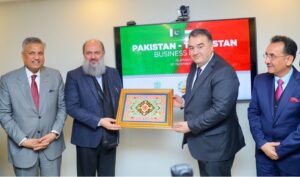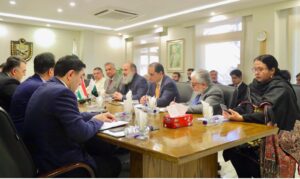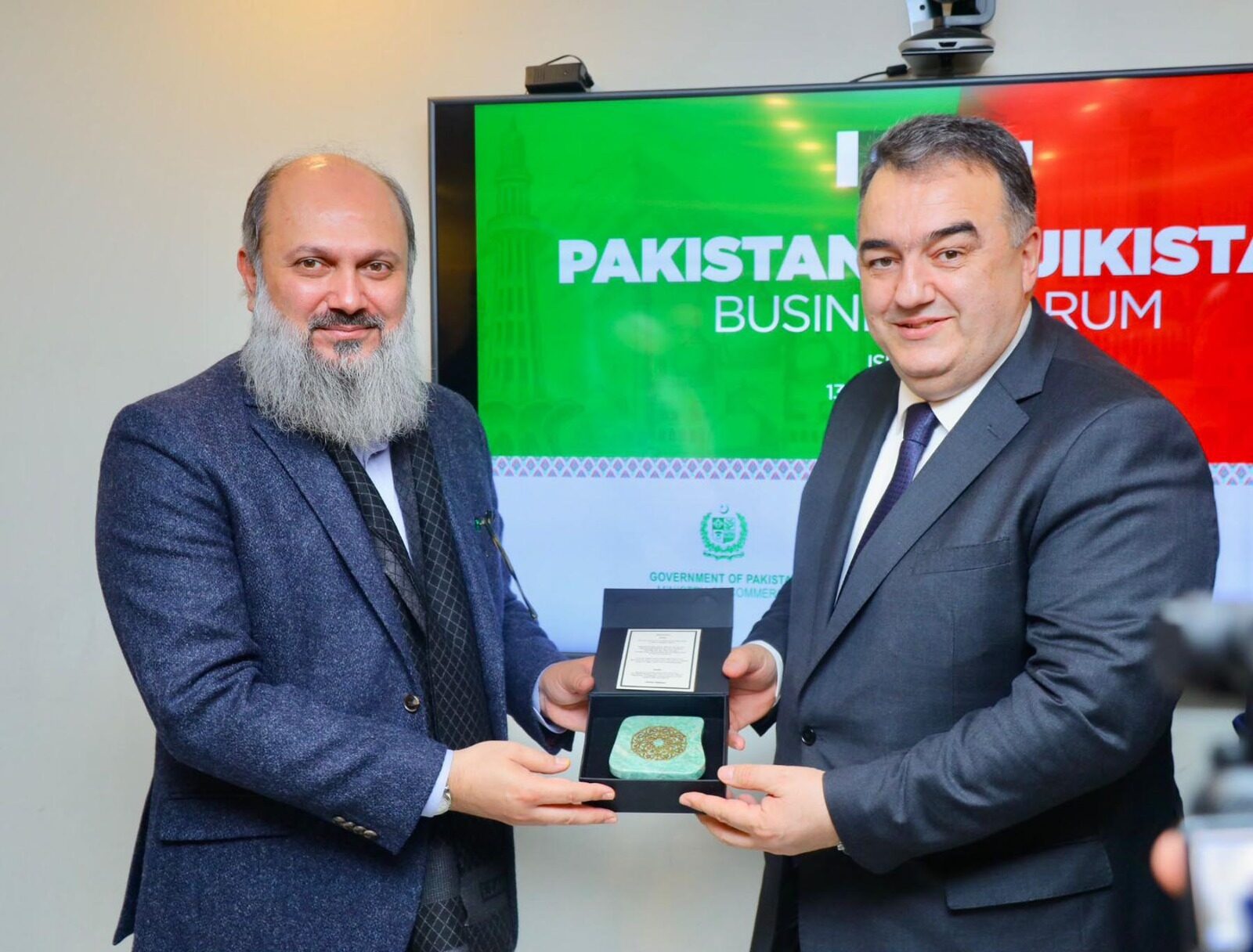Nasir Mansoor Quraishi the President of ICCI was optimistic that the Pakistan-Tajikistan business forum will go a long way in yielding fruits
ISLAMABAD ( WNAM REPORT) :Federal Minister for Commerce, Jam Kamal Khan on Friday said that the Preferential Trade Agreement (PTA) between Pakistan and Tajikistan is need of the hours and after signing the agreement bilateral trade volume will be increased manifold.
“We have already signed a Preferential Trade Agreement (PTA) with Uzbekistan and Azerbaijan and we want to follow suit with Tajikistan,” he said.
Federal Minister for Commerce, Jam Kamal Khan said this while addressing the “Pakistan Tajikistan Business Forum “along with Minister for Energy and Water Resources of the Republic of Tajikistan, Mr. Jum’a Daler Shofaqir and President Islamabad Chamber of Commerce and Industry (ICCI) , Nasir Quraishi in Islamabad Chamber of Commerce and Industry here.
In order to further tap the potential of our regional proximity between brotherly countries it is imperative to establish more frequent direct flights, enhance cooperation in the logistics sector, and arrangements for using Pakistani seaports to cater Tajik imports, he said.
The Commerce minister said that the Transit Trade Agreement (TTA) has undoubtedly provided a robust framework for growth and collaboration, however, to truly realize the potential of this agreement, it must be complemented by dynamic business forums and proactive business-to-business (B2B) engagements and providing market access to each other through a PTA.
He said that Tajikistan Minster, official and business community presence at this business forum is a testament to the enduring and mutually beneficial relationship between our nations.
The minister said that Promoting international trade, transit and investment is the pivot around which Pakistan seeks to devise its economic policies and “Our vision is to transform Pakistan into a trade, transit and trans-shipment hub ensuring connectivity with Central Asian Republics and beyond.”
Previously, trade to Central Asia and especially to Tajikistan was a tedious task due to the lack of connectivity for businessmen on both sides; however, due to the Transit Trade Agreement, the trade routes between both countries have been streamlined facilitating the seamless movement of goods and services across our borders, he said.
“I want to highlight and emphasized that despite signing the Agreement, the volume of bilateral trade between the countries does not reflect the true potential and Pakistan is blessed with an abundant array of resources ranging from mineral riches to fertile lands and the most diverse landscape.”
He said that the local industry is already producing high-end textiles, sports goods, engineering products, gems and minerals, pharmaceuticals, medical technologies mainly, including surgical instruments and IT services.
Over recent years, IT exports have consistently increased, driven by advancements in software development, digital services, and a burgeoning start-up ecosystem and government support through strategic policies and initiatives has played a crucial role in this growth, creating a conducive environment for tech companies to thrive, he said.
Jam Kamal said that as a result, Pakistan’s IT exports have reached impressive milestones, establishing the country as a competitive player in the global IT market and showcasing its potential for further expansion and innovation.
The minister said that the time has come to translate the excellent bilateral relations into mutually beneficial economic gains and “Our Visions to enhance trade with Tajikistan and to enhance the facilitation for companies participating in trade fairs in Central Asia, especially Tajikistan.
He said that Pakistan can supply rice, engineering goods, electrical appliances, textiles, apparel, pharmaceuticals, sports goods, surgical instruments, cutlery, furniture and many more products. Similarly, Pakistan can be a good market for supply by the Tajik exporters.
He said that combined with the improved economic ambience, Pakistan offers attractive investment opportunities and lucrative returns in almost all sectors of the economy.
The Government of Pakistan is playing a significant role in facilitating entrepreneurs and helping them ease of doing business.

Jam Kamal said the establishment of the Special Investment Facilitation Council (SIFC) is the key initiative of the government of Pakistan, as a one window operation for the facilitation of foreign investors.
He said that with over 240 million inhabitants, Pakistan offers a strong and large consumer market, with an ever-expanding middle class. Our strategic location at the crossroads of South Asia, Central Asia and West Asia and close proximity to the Gulf countries makes Pakistan a promising regional hub and an important market for trade and investment.
Minister for Energy and Water Resources of the Republic of Tajikistan, Mr. Jum’a Daler Shofaqir said that the role of the private sector is significant to increase the bilateral economic and trade relations between Pakistan and Tajikistan.
Tajik Minister said that a joint infrastructure project is vital for bilateral economic integration and both countries are moving forward in this regard.
He said that the seaports of Karachi and Gwadar are very important for Tajikistan, which is significant for regional economic integration.
On this occasion, the Ambassador of Tajikistan to Pakistan, Sharifzoda Yusuf described the role of the business community as key for increasing the bilateral economic relations between the two countries.
President ICCI, Nasir Quraishi was optimistic about the Pakistan-Tajikistan business forum, believing it will strengthen business-to-business and people-to-people ties between the two nations, ultimately benefiting the masses .
The ICCI plans to facilitate delegation exchanges and expos to showcase each other’s products, fostering a stronger relationship between the business communities of Pakistan and Tajikistan, he added.
He concluded by say that the Islamabad Chamber of Commerce and Industry (ICCI) was committed to fostering strong relationships between business communities of friendly countries.


